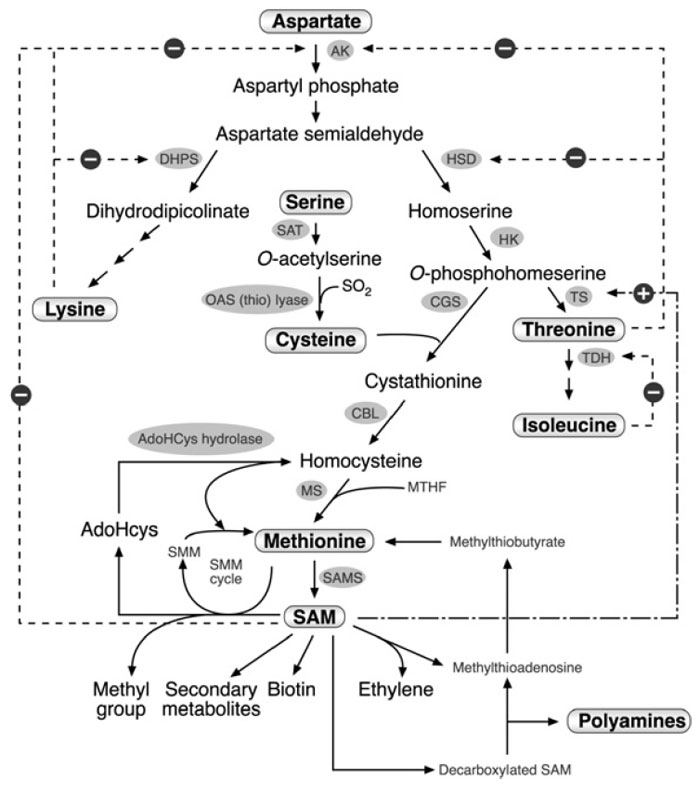The Aspartate Family Pathway That is Responsible for Synthesis of the Essential Amino Acids Lysine, Threonine, Methionine, and Isoleucine
In plants, as in many bacterial species, lysine, threonine, methionine, and isoleucine are synthesized from aspartate through several different branches of the aspartate family pathway (Fig. 3.2). While one branch of this pathway leads to lysine biosynthesis, a second branch leads to threonine, isoleucine, and methionine biosynthesis. Methionine and threonine biosyntheses diverge into two subbranches and compete for O-phosphohomoserine as an intermediate (Fig. 3.2). The entire aspartate family pathway, except for the last step of methionine synthesis (methionine synthase), occurs in the plastid. Although methionine is often considered part of the aspartate family pathway, its biosynthesis is subject to a special regulatory pattern, apparently due to its multiple functions in plants. Therefore, we will discuss the regulation of methionine biosynthesis in a separate section.
 |
| FIGURE 3.2 Schematic diagram of the metabolic network containing the aspartate family pathway, methionine metabolism, and last two steps in the cysteine biosynthesis. Only some of the enzymes and metabolites are specified. Abbreviations: AK, aspartate kinase; DHPS, dihydrodipicolinate synthase; HSD, homoserine dehydrogenase; HK, homoserine kinase; TS, threonine synthase; TDH, threonine dehydratase; SAT, serine acetyl transferase; OAS (thio) lyase; O-acetyl serine (thio) lyase; CGS, cystathionine γ-synthase; CBL, cystathionine β-lyase; MS, methionine synthase, SAM, S-adenosyl methionine; SAMS, S-adenosyl methionine synthase; AdoHcys, adenosylhomocysteine; SMM, S-methyl methionine; MTHF, methyltetrahydrofolate. Dashed arrows with a ‘‘minus’’ sign represent feedback inhibition loops of key enzymes in the network. The dashed and dotted arrow with the ‘‘plus’’ sign represents the stimulation of TS activity by SAM. |
Although both the monofunctional AK and DHPS activities are feedback inhibited by lysine, DHPS is the major limiting enzyme for lysine biosynthesis, while AK is a major limiting enzyme in the second branch of the aspartate family pathway leading to threonine, isoleucine, and methionine biosynthesis. This has been concluded based on the analysis of plant mutants as well as transgenic plants expressing recombinant feedback insensitive DHPS and AK enzymes derived from either bacteria or plant sources (Galili, 1995, 2002; Galili and Hofgen, 2002; Galili et al., 1995; Jacobs et al., 1987; 2001). The results of these functional studies had been expected since the in vitro activities of plant DHPS enzymes are much more sensitive to lysine inhibition than those of the lysine-sensitive AK enzymes (see Galili, 1995 for review).




